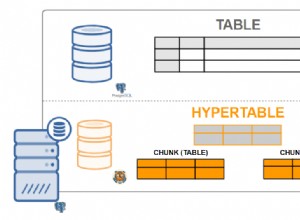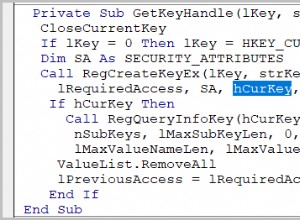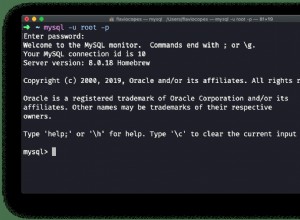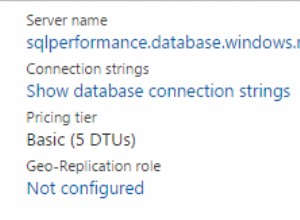Als Comando::Executar ist nicht statisch, sondern als public function... deklariert , müssen Sie etwas tun wie:
$comando = new Comando();
$queryMesasAtivas = $comando->Executar('SELECT * FROM mesas WHERE status =1 AND numero !="'.$_SESSION["mesa"].'"');
if ($queryMesasAtivas->num_rows > 0) {
while ($rowMesasAtivas = $queryMesasAtivas->fetch_assoc()) {
echo "<option value='".$rowMesasAtivas['numero']."'>Mesa ".$rowMesasAtivas['numero']."</option>";
}
}
else {
echo '<option>Nenhuma mesa ativa</option>';
}
Oder deklarieren Sie die Methode als statisch, nämlich:
public static function Executar($sql)
{
$con = new Conexao();
$con->Abrir();
$re = $con->mysqli->query($sql);
$con->Fechar();
return $re;
}
Und dann können Sie den doppelten Doppelpunkt (:: ) Syntax:
$queryMesasAtivas = Comando::Executar('SELECT * FROM mesas WHERE status =1 AND numero !="'.$_SESSION["mesa"].'"');
Ich würde nicht vorschlagen Ruft jedes Mal, wenn Sie eine Abfrage ausführen, ein Öffnen und Schließen auf, sondern eine Klasse wie diese:
class Conexao
{
private $link;
public function __construct($host = null, $username = null, $password = null, $dbName = null)
{
$this->link = mysqli_init();
$this->link->real_connect($host, $username, $password, $dbName) or die("Failed to connect");
}
public function __destruct()
{
$this->link->close();
}
public function Query($sql)
{
return $this->link->query($sql);
}
}
Dies wird dann als solches verwendet:
$conexao = new Conexao("host", "username", "password", "db_name");
$result = $conexao->Query("SELECT * FROM `table` WHERE 1 ORDER BY `id` ASC;");
Dies ist nicht nur kleiner, sondern auch leichter auf dem Server, da Sie Datenbankverbindungen nicht permanent öffnen und schließen, wodurch die CPU- und Speichernutzung reduziert wird.
Verwenden von statischen Eigenschaften für den Host usw. (behält sie auch nach __destruct im Speicher verwendet, sodass Sie sie nicht jedes Mal neu deklarieren müssen):
class Conexao
{
private $link;
private static $host, $username, $password, $dbName;
public function __construct($host = null, $username = null, $password = null, $dbName = null)
{
static::$host = $host ? $host : static::$host;
static::$username = $username ? $username : static::$username;
static::$password = $password ? $password : sattic::$password;
static::$dbName = $dbName : $dbName : static::$dbName;
$this->link = mysqli_init();
$this->link->real_connect(static::$host, static::$username, static::$password, static::$dbName) or die("Failed to connect");
}
public function __destruct()
{
$this->link->close();
}
public function Query($sql)
{
return $this->link->query($sql);
}
}
$conexao = new Conexao("host", "username", "password", "db_name");
$result = $conexao->Query("SELECT * FROM `table` WHERE 1 ORDER BY `id` ASC;");
$conexao->__destruct(); // Destroy the class
$conexao = new Conexao(); // Reinitialise it
$result = $conexao->Query("SELECT * FROM `table` WHERE 1 ORDER BY `id` ASC;");
Verwendung einer Konfigurationsinstanz der Verbindungsklasse:
config.php-Datei:
<?php
require_once 'path/to/Conexao.php';
$conexao = new Conexao("host", "username", "password", "db_name");
?>
index.php-Datei:
<?php
require_once 'config.php';
$result = $conexao->Query("SELECT * FROM `table` WHERE 1 ORDER BY `id` ASC;");
?>
Die Klasse hat jetzt einen Elternteil auf my github !




